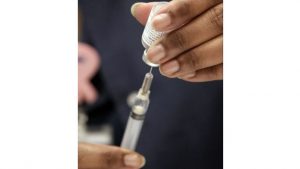 At least three people have died as the health authorities here worry about the return of diphtheria to Haiti due to lack of vaccination of children.
At least three people have died as the health authorities here worry about the return of diphtheria to Haiti due to lack of vaccination of children.
During the first seven months of this year, 72 probable cases of diphtheria were reported, with 74 per cent of the cases being children under 10 years old.
Health officials have said 22 cases were confirmed in the laboratory, three of whom have since died.
They said immunisation status is unknown for 54.5 per cent of confirmed cases; 18 per cent were vaccinated; and 27 per cent were not vaccinated. The confirmed cases come from four departments: Artibonite, Centre, West, and Southeast.
Diphtheria is an infectious disease due to three bacterial species capable of producing a diphtheria toxin. The bacterium is transmitted by air, specifically via aerosols emitted during a cough or sneezing, during direct contact with a patient or asymptomatic carrier.
The incubation period is usually two to five days. The most characteristic symptom of this disease is the presence of whitish “false membranes” in the tonsils (diphtheria) or in the wound (cutaneous diphtheria). Diphtheria angina is the usual form of the disease.
It is characterised by pharyngitis, fever, swelling of the neck, and headache. In some cases, the toxin can lead to paralysis of the central nervous system or the diaphragm and throat, resulting in death by asphyxiation.
Treatment of diphtheria consists of immediate administration of anti-diphtheria serum by intramuscular injection and antibiotics.
The vaccine is the only way to be protected against diphtheria because there is no natural immunity. The vaccines against diphtheria are effective and well tolerated.
